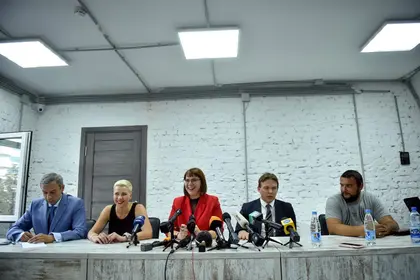The activity of the democratic movement, which resulted from the August 2020 Belarusian presidential election fraud, turned sluggish after the initial media attention. By the start of the large-scale invasion of Ukraine it had nearly died out.
Now, after a series of scandals over funding and with mounting criticism from Ukrainian officials over lack of adequate action against the Russian aggression, the Belarusians are revamping themselves with a new and enlarged Coordination Council aimed at uniting the efforts of democratic forces and diaspora organizations against the autocratic regime of Belarus.
JOIN US ON TELEGRAM
Follow our coverage of the war on the @Kyivpost_official.
Plagued with low public support after years of inactivity, and with differing opinions within the council on its role, can the newly reformed body unite diaspora and political groups to become a vehicle for change in Belarus?
The Coordination Council was created in 2020, on Sviatlana Tsikhanouskaya’s initiative, to organize the process of overcoming the political crisis in Belarus and ensure social harmony in a time when the opposition was preparing for a political transition of power, a transformation that never occurred.
Tsikhanouskaya is widely believed to have won a convincing victory in the presidential election in August that was rigged by the incumbent president, Belarus’s dictator and Moscow’s vassal, Aleksandr Luksashenko.

Thinking Out Loud
After over two years of conspicuous inactivity, and in a bid to increase its legitimacy, the council’s membership has been enlarged by inviting participation of more representatives from diaspora groups and politically active Belarusians.
The new council comprises 115 members, of which 107 are active and 8 are incarcerated in Belarus. Overall, 86 applications from organizations and 49 individual applications were submitted, with 73 delegates from organizations and 15 individuals being admitted (of which the author is one). Members from the old council were carried into the new body.
Active since Feb. 8, 2023, the new council has had time to create a new charter and is going through the motions of electing a speaker and secretary, but no real work has yet come from the body. And while the reformed structure was set up with the best intentions, internal strife and difference in opinions and agendas are proving hard to overcome.
One recurring argument is whether the council has the right to call itself a parliament in exile. The other point of contention is coexistence with Tsikhanouskaya’s United Transitional Cabinet of, the self-styled executive body of the Belarusian democratic movement.
The identification of the Coordination Council as a parliament in exile for Belarus has not been made official but is being discussed more widely in Belarusian opposition circles.
Two of the defining characteristics of a parliament are democratic elections and legislative functions. The council fails on both accounts.
Since no member of the council, past or present, was elected by the wider Belarusian public – at least on this point there is some consensus among its members – the identification of the council as a parliament seems far-fetched.
Commenting on the council’s parliamentary status, Volha Kavalkova, a long-time council member, and in the running to be the council’s speaker, said: “In its organizational form and activities, it is similar to a parliament, but it differs in the formation procedure and cannot, like a real parliament, implement the decisions made on the territory of Belarus.”
She added: “The council strives for direct selection of delegates, but even more – would like to return to Belarus and work there.”
Indeed, as a body in exile, the council cannot implement anything in Belarus, but with the implementation of legislation being the prerogative of the executive, the United Transitional Cabinet, Kavalkova’s insinuation of the possibility of the council taking on such a role seems at odds with other structures of the Belarusian democratic movement.
A more transparent view, and one more in keeping with a representative, or pseudo-legislative, body is presented by another Coordination Council member, Mikhail Rubin: “In my view, it is not a parliament, but a platform for discussion and decision making.”
What is needed is agreement on the way forward and for deeds to replace words.
You can also highlight the text and press Ctrl + Enter






